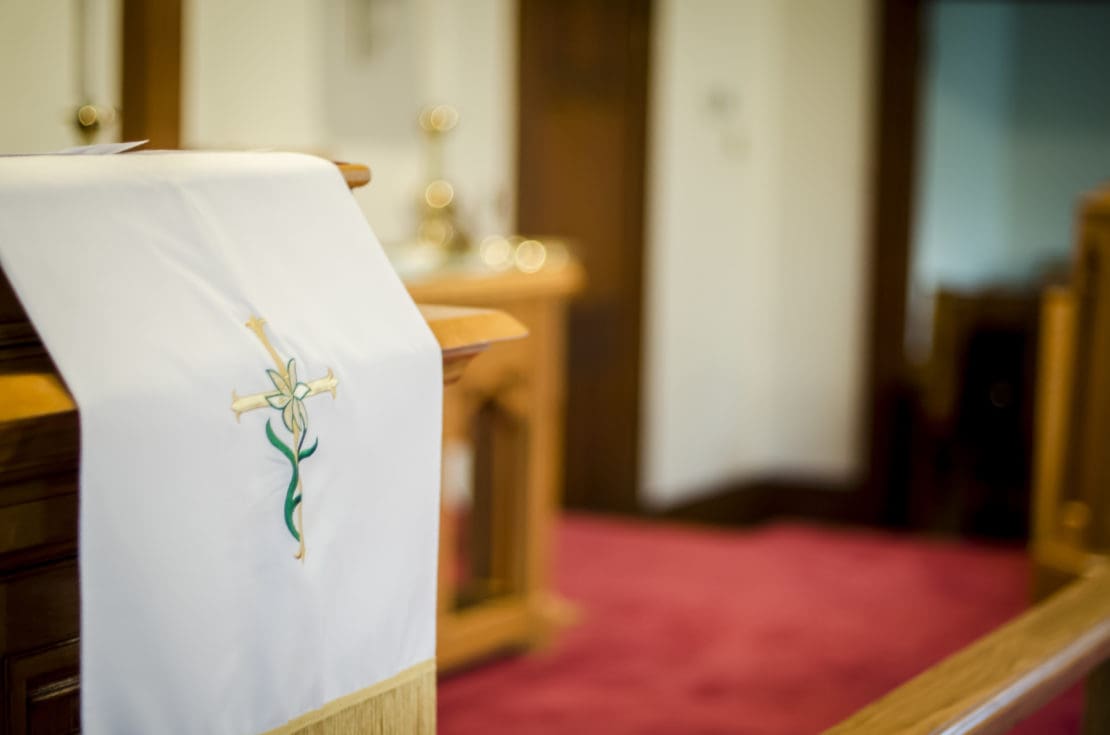From the pulpit to the pews: Preaching with clarity and charity about homosexuality
And how are they to hear without a preacher? (Rom 10:14) Saint Paul asks this pressing question about the Gospel in general. We could ask it about particular dimensions of the Gospel, about those hard teachings that are not heard because they are not preached. Perhaps foremost among these today is the truth of human sexuality — and, in particular, the topic of homosexuality.
The two essentials that govern preaching in general apply to this topic tenfold: clarity and charity. Clarity about the truth is an act of charity toward souls. And charitable speech is the only vehicle worthy of the truth. With these two fundamentals in mind we can point out some other guidelines for addressing this sensitive and important topic.
Integrity. No, this does not apply to the personal integrity of the preacher (although we hope that is in place as well!). Rather, it refers to the integrity of the topic. We should not speak of homosexuality in isolation, as though it were a topic on its own. We need to speak about the whole truth of human sexuality, and within that context address homosexuality. The Church’s teaching on sexuality is whole and entire — integral. She does not propose different understandings or standards for different groups. All are called to chastity according to their states in life (CCC 2348).
The challenges homosexuality brings to the culture and the Church must be situated within the broader context. The topic is part of our culture’s overall confusion about sexuality. It comes across as odd to fasten on the problems of homosexuality without addressing the grave damage wrought by divorce, contraception, adultery, fornication, and pornography. Indeed, without this integral approach, people have good reason to find the Church’s message unconvincing.
Persons. Homosexuality is a highly charged topic in politics and in our culture. As such, we risk viewing it as an “issue” — and forgetting the persons for whom it is not just an “issue” but a real life struggle. Speaking on this topic requires a sensitivity and consideration of persons in the concrete and real circumstances.
For the sake of comparison, consider another “hot button” topic: the death penalty. If a priest preaches on the death penalty, the chances are slim to nil that the topic will impact any one in his congregation personally. Some might care about the issue deeply. But few, if any, will know someone directly involved in administering or suffering the death penalty.
The topic of homosexuality is different. First, it involves some of the most personal dimensions of the person: identity, intimacy, relationships. Further, just about everyone in the pews is directly involved to one degree or another: the teenager struggling with same-sex attractions…the friend who wants to know how to support him and be true to his faith…the parents whose child has “come out”…and so on. This topic gets personal in a hurry.
For the preacher this means keeping in mind the persons hearing him. This is not a hypothetical matter or something about other people. It is about those in the pews every Sunday. Yes, it is politically charged and a cultural hot potato. But it is not only or even primarily about politics and culture. It is about persons desiring to love authentically and needing to be formed to do so.
One specific implication of this is that the preacher ought not trivialize experiences. No, nobody is “born that way.” But plenty of people feel as though they were — and that, even as it is corrected, should not be treated lightly. Just because a person’s feelings are not in line with the truth does not mean that they should be dismissed or trivialized. Rather, they should be charitably directed to what is true.
Familiarity. Our Lord’s parables are rooted in what is familiar to his hearers, what they already know. Indeed, the parable of the sower and the seed is little more than an observation of everyday truth: The sower went out to sow… This is a great lesson for the preacher: Begin with what they already know.
One thing we already know is the confusion, pain, loneliness, and isolation that decades of sexual confusion has brought us. Nobody in the pews has been untouched by the sexual confusion that has led to so much personal, familial, and cultural pain. We know also the desire for wholeness and authentic relationships. This context helps us to understand — and, please God, communicate — what the Church’s teaching is: saving truth extended to a broken world.
Precision. Attentiveness to the personal dimension of this topic should never be at the expense of precision in thought and words. In fact, the two go together. Each of us has experienced a “That’s it!” moment when someone has expressed in clear terms what we have thought or felt — even if it wasn’t easy to hear. Especially since the issue of homosexuality is so given to confusion and rhetoric, such clarity of thought and precision of terms is essential.
Hence, the preacher must have clear in his own mind both the content and the expression of the Church’s teaching. As an “expert in humanity” (Paul VI) the Church has tried to give accurate expression to the truth of human sexuality. The preacher should proceed with confidence in he teachings and terms. Just as important, he should avoid the phrases or terms that are, in the end, more political than pastoral in meaning.
Chastity. In politics the old saying is, “You can’t beat something with nothing.” This holds true in the care of souls as well. We must preach not so much against something but for something. This means that whenever we discuss sexuality we must discuss chastity. This is owed to our hearers. Without it, they receive a partial and therefore distorted teaching on human sexuality.
Two points should be kept in mind and communicated. First, chastity is possible. The culture presumes that sexual restraint is impossible. And yet the preacher can point to many saints in history — and many heroic souls today — that show otherwise. Second, chastity is life-giving. Again, our culture thinks that chastity — even if it’s possible — is a mere burden, imposition, or even harmful. So the preacher must speak of the freedom and peace that chastity brings to a person — that it involves a No, but always at the service of a greater Yes.
The Cross. Saint Paul’s sermon in Athens serves as a cautionary tale for all preachers. Brilliantly crafted, hitting all the right notes, designed perfectly for his audience — it failed. And it did so because the Apostle failed to mention one thing: the Cross. Stung by this failure, Saint Paul then chose “to know nothing…except Jesus Christ and him crucified” (1 Cor 2:1). If we leave the Cross out of our preaching, we should not hope for success.
Indeed, if we omit the Cross then we are preaching not the Gospel at all but some kind of stoic, self-help philosophy. The absence of the Cross leaves us with no way to address either present the suffering that attends same sex attractions or the struggle that chastity requires. We only understand our own wounds by seeing them through the wounds of Christ. We only know the moral life’s demands by way of His sacrifice on the Cross. Only in the shadow of the Cross do these things become clear. The Cross reveals the beauty of chastity, because it was on the Cross the chaste Bridegroom gave His life for His beloved. The Cross reveals the power of chastity, because from the Bridegroom’s sacrifice comes the life of the soul.
And since our Lord gave His greatest sermon from the Cross, the preacher must always accompany his preaching with sacrifices for his hearers.
Fr. Paul Scalia is a priest of the Archdiocese of Arlington, where he currently serves as the Episcopal Vicar for Clergy. He is the head of the board of directors for Courage International. A frequent speaker and writer on matters of faith and morals, Fr. Scalia’s first book, That Nothing May Be Lost, was published by Ignatius Press in 2017.



(3) Comments
Cecilia Schlepers
Thank you for this clear and concise writing by Fr. Paul Scalia. I am the mother of a son with same sex attraction. In this current social atmosphere of confusion on this subject, it is so refreshing to read something so clear as this. Thank you for Courage and Encourage.
Helen
Thank you, Father Scalia,
We are all called to lead a chaste life. Thank you for speaking the truth with clarity and love ❤️
BJ
It’s too simplistic to say “born this way” represents feelings not in line with the truth. What most people mean by that phrase isn’t some statement about biology. What they mean is, “you cannot hold me to any behavior other than the ones I choose as a result of being born this way”. So, the pastor could reply: “OK. What’s your point?”. There is a meaning of “born this way” that is very much in line with the facts. That meaning is “I don’t understand how I can be this way” and only a force as strong as biology explains it. That’s a crucial thing for a homosexual to face: this question and meaning of the phrase go directly to the points Fr makes about the cross and the mystery of God’s creation and the problem of evil. Pastors of souls should be careful to answer the _real_ question that underlies the statement. There is no need to go anywhere near the rabbit hole of biological causes because they aren’t really germane in the end.